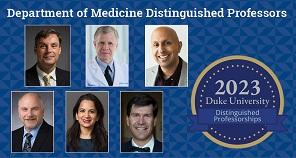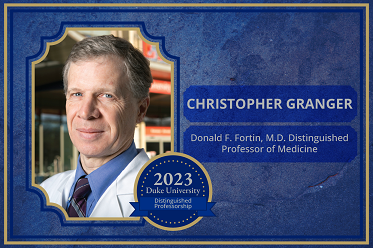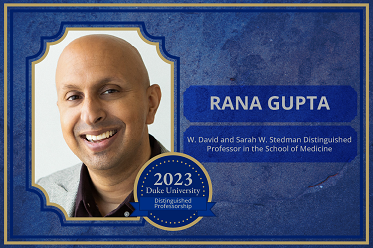
Duke University has awarded Distinguished Professorships to 44 faculty members, six from the Department of Medicine—Professor Daniel James George, MD, Medical Oncology; Professor Christopher Bull Granger, MD, Cardiology; Professor Rana K. Gupta, PhD, Endocrinology, Metabolism and Nutrition; Professor Steven Patierno, PhD, Medical Oncology; Professor Svati H. Shah, MD, MHS; and Professor Christopher Wildrick Woods, MD, Infectious Diseases.
Distinguished Professorships recognize faculty scholars who are well-established members of the Duke academic community who have also achieved distinction as creative scholars in their field or in their ability to transcend disciplines.
Over the coming weeks, join us in recognizing these Distinguished Professors through our Distinguished Professor Spotlight.
This week, we feature Christopher Granger, MD, and Rana Gupta, PhD.
Christopher Granger, MD, Donald F. Fortin, MD, Distinguished Professor of Medicine
Tell us about your clinical, academic, or research interest and why you are passionate about this topic or area of focus.

I am passionate about improving survival for patients with out-of-hospital cardiac arrest. We are working with communities across North Carolina in the RACE CARS trial that is testing how patients can be more likely to get bystander CPR and early cardiac defibrillation. We have shown that when patients get bystander CPR and have an Automatic External Defibrillator placed before EMS arrives, they are much more likely to survive.
Who has influenced you the most in life and why?
The person who has influenced my professional career the most is Rob Califf. This makes it especially appropriate that I follow him as the Donald F. Fortin MD Endowed Distinguished Professor! Rob is an inspiring, passionate advocate for generation of high-level evidence to improve patient care, and he has certainly inspired and trained me to be part of that mission!
What do you feel is your most significant professional contribution(s) to the field of medicine?
My most significant contributions have been in helping to lead large clinical trials of treatments for heart disease, such as the ARISTOTLE trial of apixaban versus warfarin for atrial fibrillation, called one of the most important practice-changing trials in the last 20 years by the prior editor of New England Journal of Medicine.
Rana Gupta, PhD, W. David and Sarah W. Stedman Distinguished Professor in the School of Medicine
Tell us about your clinical, academic, or research interest and why you are passionate about this topic or area of focus.

One of the first concepts I remember learning about in grade school biology was the concept of biological adaptation. I remember being amazed by how different animals and species adapt to changes in their environment. When I began to learn about “adipose tissue” (known to most as “fat tissue”) as a postdoctoral fellow, I was struck by the degree to which it can change in size, appearance, and function, as it adapts to changing environmental and physiological conditions. This ability to change, or it’s “plasticity,” is exemplified by the condition of obesity, which now afflicts half of the population in the United States. Adipose tissue plasticity is critical to maintain health in adulthood and is what is often lost in the setting of disease. Moreover, adipocytes (or “fat cells”) can send signals to the rest of the body to regulate the adaptation of other tissues. The study of adipose tissue offers a lens through which we can learn about mechanisms controlling the ability of our cells, tissues, and organs to adapt to new challenges and how they “talk” to one another. Importantly, this line of research may help identify factors that predict or influence susceptibility to metabolic disease and perhaps even devise therapeutic strategies to treat obesity and associated disorders.
Who has influenced you the most in life and why?
I am fortunate that I knew early in life what I wanted to do as a profession. I was exposed to science at a young age. My father, now retired, was a chemical engineer. My late mother was a laboratory analyst at an environmental testing company until the time of her passing. During my high school years, I realized that I too was destined for a career in science. We had a wonderful AP Biology teacher in high school that made science fun. In college, I realized that I was meant to work in a laboratory. The research lab I volunteered in as an undergraduate opened my eyes to the joys of academic science. I loved performing experiments, seeing new data emerge, and witnessing exciting discoveries being made all around me. The idea of discovering something that perhaps no one else in the world knew was always truly exciting. It is undoubtedly these role models that I had early in my education that influenced my path in life.